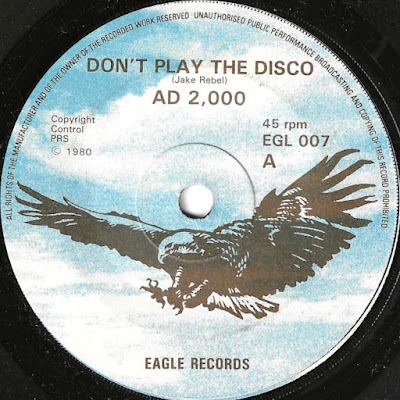
Man and bird cheer Bristol Rovers into the Second Division
Label: Columbia
Year of Release: 1974
In the last few months, I've let an Old English Sheepdog/ Poodle crossbreed dog into my life (or a "Sheepadoodle" if you want to take the quick and easy way of describing the mutt). Even as puppies, these dogs are a weighty great ball of furry energy, an easily distracted twenty kilos of hyperactivity and teeth. On many occasions, I've found myself running after her screeching "No! NO! NO! NO! NO! NO! STOP IT!" having been delighted by her doe-eyed fluffiness only one minute before.
I sometimes wonder if at some point in his life Rod Hull got himself into a similar situation and it was partly the inspiration for Emu. The camp delight followed by the frenzied panic seems only too familiar to me, and may be familiar to any other pet owners who haven't quite got to the point where their beasts have been entirely tamed into predictable behaviour.
Emu, of course, was the King Terror of them all, most famously attacking
Michael Parkinson but also getting his beak into
Johnny Carson,
Richard Pryor,
Snoop Dogg,
John Stapleton and Nick Owen (at the same time) and just about anyone else who strayed into his shadow. Critics of the act have pointed out that it was essentially the same playground gag over and over again, but that's actually both incorrect as well as harsh - as a children's entertainer in the seventies, it wasn't Emu's surprise attacks that amused me but Rod Hull's low-budget parodies of television on "
Emu's Broadcasting Company", many of which continue to make me smile today. And even if he did become best known for his chat show misdeeds, what performances they were. Very few puppeteers have ever managed to make a creature seem as brutally, magnificently and anarchically alive as Emu. Each peck and rumble felt frighteningly real, with Hull's body seemingly thrown around helplessly by a wild and frantic bird he was struggling to restrain. Try doing it that convincingly yourself - though of course, you'd need to find an Emu puppet first.
That's exactly what Hull did initially at the very start of his British showbiz career. He found Emu in a prop cupboard in Australia and took him back home with him, and to cut a long and much-repeated story short, a star was very quickly born.
The bird's recording history, on the other hand, is less successful or opaque. Rolf Harris
produced an Emu single in 1972 which claimed to be "Emu singing" but if you slowed the record down it was pretty clear that it was actually Rolf speeding his own voice up, the dirty spiv. Given that Emu was an entirely mute creation in the UK, it's not easy to see why this single was necessary, or why anyone thought something so squeaky and cutesy could easily be associated with the bird. While some copies of it came with a sketch of Rod Hull on the sleeve, so far as I'm concerned it is Not Canon and we should all cock a snook at it.
This, then, was the pair's proper recording debut in 1974 and... well, I have to be honest, words fail me for this one as well. The track consists of Rod Hull singing football supporting lyrics to the tune of "She'll Be Coming Round The Mountain" with the Bristol Rovers team. It wasn't a song commonly (if ever) sung by supporters of the club, and beyond the fact that Hull was a supporter, it's not clear how it came into being - they had just reached the second division of football (or the Championship League in today's footballing language) but hardly had enough supporters nationally to give them a profit-making single. Despite this, EMI obviously picked up the tab, everyone got their recording studio time, and this track was quickly recorded, released then promptly forgotten by almost everyone except ardent Bristol Rovers fans.

















